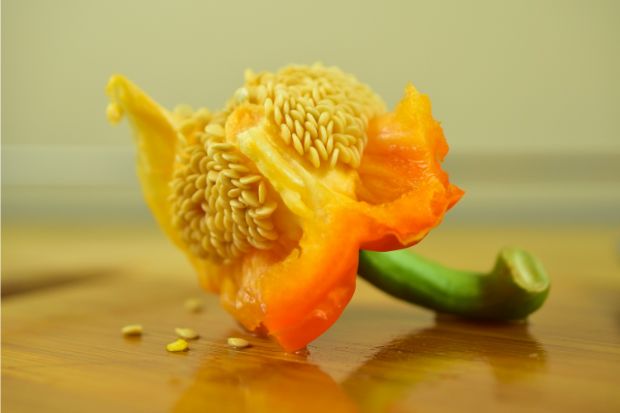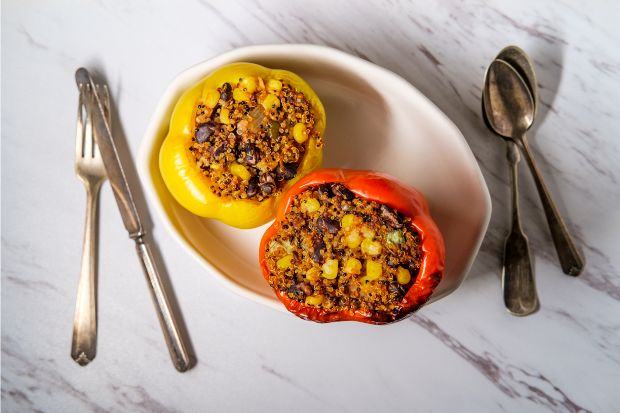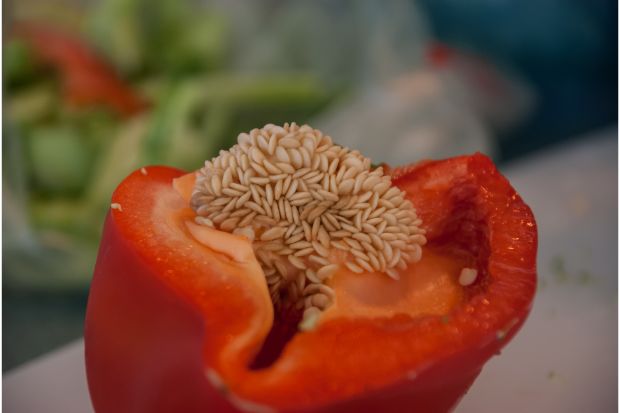Bell peppers are a great addition to a variety of dishes, and they can even be eaten raw if that’s what you prefer. That being said, you might be wondering if you can eat bell pepper seeds.
Yes, you can eat bell pepper seeds. At one time, it was recommended that you not eat the seeds because it was thought that the seeds were too hot and spicy. Now we know this isn’t true, so eating bell pepper seeds is rarely a problem.

Should You Eat Bell Pepper Seeds?
The question of whether or not you can eat the seeds in bell peppers is quite different than wondering if you should eat them. The truth is, you can eat bell pepper seeds if you like, but many people find them to have a less-than-desirable taste. Many people do not like the texture of the seeds, either, especially when they’re in soups or stews.
Are Bell Pepper Seeds Spicy?
No, bell peppers seeds are generally not spicy. In older cookbooks, cooks were advised to throw away the seeds in bell peppers because it was believed that they had capsaicin in them, which is an ingredient that makes foods spicy and hot. As mentioned earlier, we now know that this isn’t true. If bell peppers taste spicy it is usually because other ingredients have been added to them. The amount of capsaicin, if it is present at all, is too small to make bell pepper seeds spicy.
Are Bell Pepper Seeds Toxic or Poisonous?
No, bell pepper seeds are not toxic or poisonous. Many bell pepper seeds have a somewhat bitter taste, which is why it is still recommended that you remove them before using a fresh bell pepper in your next recipe.
Are Bell Pepper Seeds Good for You?
The news about the nutritional value of bell pepper seeds is both good and bad. While few studies have been conducted on bell pepper seeds, one study found that these seeds have protein, potassium, and even a little bit of fiber. That being said, they also contain tannins and phytic acid, which can potentially be unhealthy.
Why Remove Bell Pepper Seeds?

As mentioned earlier, bell pepper seeds taste a little bitter, and they can ruin a recipe if you use too many of them. Most people remove bell pepper seeds because even though they are edible, they simply do not taste good to a lot of people. If you include the seeds in your recipe, having small crunchy-texture bits in the dish might be a turnoff to many people.
Between the taste and the texture of bell pepper seeds, it is best to remove them before you use the peppers themselves in a recipe. This is especially important if you intend to use a large number of bell peppers in your recipe. In this case, the taste of the seeds can be overwhelming to many people. In short, it is simply best to use bell peppers in your recipes after you have removed all of the seeds.
How To Remove Bell Pepper Seeds
It is easy to remove bell pepper seeds. The first thing you should know is that the membrane that connects the seeds to the rest of the bell pepper can have capsaicin content. This means that when removing the seeds of a bell pepper, it’s best to remove the entire white membrane and not just the seeds. Use a sharp knife to do this, and wear gloves so that traces of capsaicin don’t get on your hands. Once the membrane and seeds are removed, you can dice or slice the peppers however you like, depending on what’s specified in the recipe you’re using.
The good news about removing seeds from peppers is that the process is very simple, and it shouldn’t take you long. It’s a simple step that can give your finished dish an improved texture and taste.
What About Hot Peppers?
In case you’re wondering about the seeds in other peppers (hot peppers, for instance) just know that the same rules apply. Even with these peppers, the spiciness doesn’t come from the seeds but instead is found mostly in the membrane of the peppers.
Even today, many people believe that pepper seeds are what cause the peppers to be spicy, but that is simply not the case. With all types of peppers, it may be best to throw the seeds away, because those seeds don’t contribute much if anything to most recipes.
